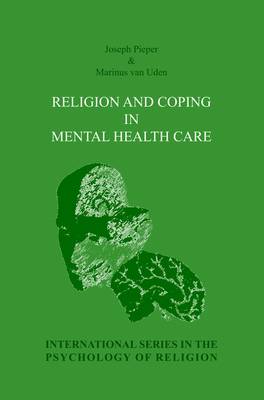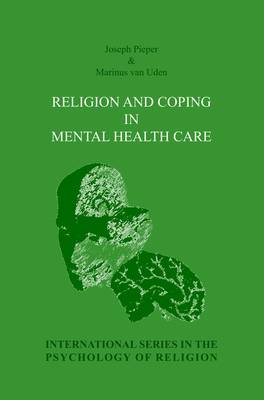
- Retrait en 2 heures
- Assortiment impressionnant
- Paiement sécurisé
- Toujours un magasin près de chez vous
- Retrait gratuit dans votre magasin Club
- 7.000.0000 titres dans notre catalogue
- Payer en toute sécurité
- Toujours un magasin près de chez vous
Description
Joseph Pieper and Marinus van Uden have proposed a book consisting of previously published papers on the topics of religion, coping, and mental health care. It covers quite a bit of territory: the complex relationships between religion and mental health, surveys that present the views of therapists and patients about the interface between religion and mental health, a case study of a religious patient struggling with psychological problems, empirical studies of religious coping among various groups, and a method for teaching the clinical psychology of religion.
Although the papers are diverse, they are unified by several themes. First, the papers convey a balanced approach to religion and psychology. They speak to the potentially positive and negative contributions religion can make to health and well-being. Second, several of the papers focus on the role of religious coping among patients in the Netherlands. This focus is noteworthy since the large majority of this theory and research has been limited to the USA. Third, they underscore the value of a cross-cultural approach to the field. Their surveys point to the importance of religious/worldview perspectives to many patients (and therapists) in the Netherlands, even though the culture is more secularised than the USA. However, their papers also suggest that the manifestation of these religious/worldview perspectives may take different shape in the Netherlands. Fourth, the papers have clinical relevance. The case history of the obsessive-compulsive patient by Van Uden (ch. 4) contains an excellent example of the way in which religious resources can be accessed to counter dysfunctional behaviours.
This volume shows initial effort in a newly emerging area of study. It is encouraging to see a significant body of research and practice on the psychology of religion and coping coming out of the Netherlands. It could stimulate further advances in a more cross-culturally sensitive, clinical psychology of religion.
- Kenneth Pargament, Professor of Psychology, Bowling Green State University in Ohio, USA
Although the papers are diverse, they are unified by several themes. First, the papers convey a balanced approach to religion and psychology. They speak to the potentially positive and negative contributions religion can make to health and well-being. Second, several of the papers focus on the role of religious coping among patients in the Netherlands. This focus is noteworthy since the large majority of this theory and research has been limited to the USA. Third, they underscore the value of a cross-cultural approach to the field. Their surveys point to the importance of religious/worldview perspectives to many patients (and therapists) in the Netherlands, even though the culture is more secularised than the USA. However, their papers also suggest that the manifestation of these religious/worldview perspectives may take different shape in the Netherlands. Fourth, the papers have clinical relevance. The case history of the obsessive-compulsive patient by Van Uden (ch. 4) contains an excellent example of the way in which religious resources can be accessed to counter dysfunctional behaviours.
This volume shows initial effort in a newly emerging area of study. It is encouraging to see a significant body of research and practice on the psychology of religion and coping coming out of the Netherlands. It could stimulate further advances in a more cross-culturally sensitive, clinical psychology of religion.
- Kenneth Pargament, Professor of Psychology, Bowling Green State University in Ohio, USA
Spécifications
Parties prenantes
- Auteur(s) :
- Editeur:
Contenu
- Nombre de pages :
- 184
- Langue:
- Anglais
- Collection :
- Tome:
- n° 14
Caractéristiques
- EAN:
- 9789042019973
- Date de parution :
- 01-01-05
- Format:
- Livre broché
- Format numérique:
- Trade paperback (VS)
- Dimensions :
- 155 mm x 234 mm
- Poids :
- 290 g

Seulement chez Librairie Club
+ 181 points sur votre carte client de Librairie Club
Les avis
Nous publions uniquement les avis qui respectent les conditions requises. Consultez nos conditions pour les avis.






